Related Research Articles

Lord Lovat is a title in the Peerage of Scotland. It was created in 1458 for Hugh Fraser. The holder is also the Chief of Clan Fraser of Lovat.

William FitzWilliam, 1st Earl of Southampton, KG, English courtier and soldier, was the third son of Sir Thomas FitzWilliam of Aldwark and Lady Lucy Neville, daughter of John Neville, 1st Marquess of Montagu.
The Brandlings of Newcastle were a wealthy family of merchants and land and coal owners in Newcastle upon Tyne and Northumberland.
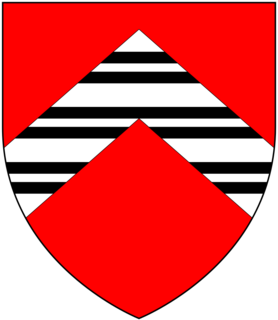
Sir George Throckmorton of Coughton Court in Warwickshire, England, was a Member of Parliament during the reign of King Henry VIII.

Henry III, Landgrave of Upper Hesse, called "the Rich" was the second son of Louis I of Hesse and his wife Anna of Saxony.
William Burley was MP for Shropshire nineteen times and Speaker of the House of Commons of England.

Sir Humphrey Wingfield was an English lawyer and Speaker of the House of Commons of England between 1533 and 1536.
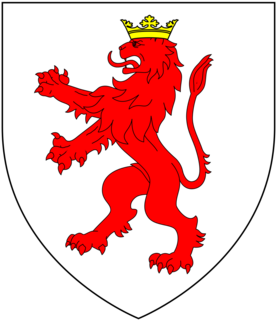
James Turberville was Bishop of Exeter from 1555.

Anna of Saxony was a princess of Saxony by birth and Electress of Brandenburg by marriage.
Simon Haynes or Heynes was Dean of Exeter between 1537 and 1552.

Sir Giles Strangways, of Melbury House, Melbury Sampford, and of Abbotsbury, both in Dorset, was an English politician.
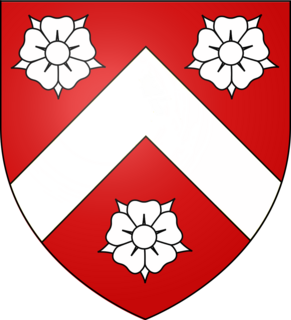
Sir Nicholas Wadham of Merryfield in the parish of Ilton, Somerset and Edge in the parish of Branscombe, Devon was the grandfather of Nicholas Wadham (1531–1609), posthumous co-founder of Wadham College, Oxford whose wife Dorothy Wadham outlived him and, in her advanced old age, saw the project through to completion.

Sir Thomas Grenville II, K.B.,, lord of the manors of Stowe in Kilkhampton, Cornwall and Bideford, Devon, Sheriff of Cornwall in 1481 and 1486. During the Wars of the Roses, he was a Lancastrian supporter who had taken part in the conspiracy against Richard III, organised by the Duke of Buckingham. On the accession of King Henry VII (1485–1509) to the throne, Sir Thomas was appointed one of the Esquires of the Body to Henry VII. On 14 November 1501 upon the marriage of Prince Arthur to Katherine of Aragon, he was created a Knight of the Bath. He served on the Commission of the Peace for Devon from 1510 to his death in circa 1513.
John Shillingford, of Exeter and Shillingford, Devon, was an English politician.
Powderham is a former manor on the coast of south Devon, England, situated within the historic hundred of Exminster, about 6 miles (9.7 km) south of the city of Exeter and adjacent to the north-east of the village of Kenton. It consists in part of flat, formerly marshy ground on the west bank of the River Exe estuary where it is joined by its tributary the River Kenn, the site of Powderham Castle, originally the fortified manor house of Powderham. On the opposite side of the Exe is the small village of Lympstone and almost opposite is Nutwell Court in the parish of Woodbury, formerly the castle or fortified manor house of the powerful mediaeval Dynham family.

George Basset, of Tehidy in the parish of Illogan, near Redruth in Cornwall, was an English politician.
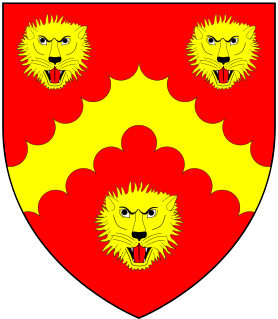
John Peryam, of Exeter, Devon, was elected four times as a Member of Parliament, for Barnstaple 1584, Bossiney 1586, Exeter 1589 and 1593. He served as Mayor of Exeter. He was the younger brother of Sir William Peryam (1534-1604) of Little Fulford, near Crediton in Devon, Lord Chief Baron of the Exchequer.
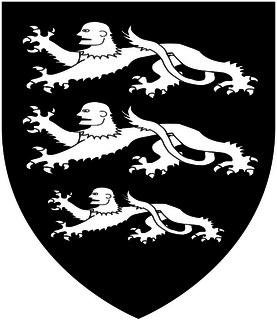
Nicholas Radford of Upcott in the parish of Cheriton Fitzpaine, and of Poughill, Devon, was a prominent lawyer in the Westcountry who served as Member of Parliament for Lyme Regis, Dorset and Devon (1435). During the anarchic times of the Wars of the Roses he was caught up in the dynastic Westcountry rivalry between Thomas de Courtenay, 5th Earl of Devon, of Tiverton Castle, for whom during his minority he had acted as steward, and William Bonville, 1st Baron Bonville, of Shute. His murder in 1455 by the Earl's faction "ranks among the most notorious crimes of the century", and was the precursor of the Battle of Clyst Heath (1455) fought shortly thereafter near Exeter by the private armies of the two magnates. He served as a Justice of the Peace for Devon (1424-1455), as Escheator for Devon and Cornwall (1435-6), Recorder of Exeter (1442-1455) and as Tax Collector for Devon in 1450 and as Apprentice-at-law for the Duchy of Lancaster (1439-1455).
Sir William Tyrwhitt, of Kettleby, Lincolnshire was an English courtier and Member of Parliament.
References
- ↑ "SIMON, John (by 1458-1524), of Exeter, Devon. - History of Parliament Online". www.historyofparliamentonline.org.
| This article about a 16th-century Member of the Parliament of England is a stub. You can help Wikipedia by expanding it. |